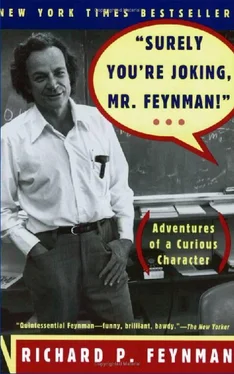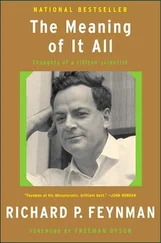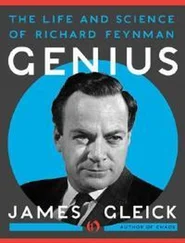Wheeler and I thought the next problem was to turn to the quantum theory of electrodynamics, which had difficulties (I thought) with the self-action of the electron. We figured if we could get rid of the difficulty first in classical physics, and then make a quantum theory out of that, we could straighten out the quantum theory as well.
Now that we had got the classical theory right, Wheeler said, “Feynman, you’re a young fella—you should give a seminar on this. You need experience in giving talks. Meanwhile, I’ll work out the quantum theory part and give a seminar on that later.”
So it was to be my first technical talk, and Wheeler made arrangements with Eugene Wigner to put it on the regular seminar schedule.
A day or two before the talk I saw Wigner in the hail. “Feynman,” he said, “I think that work you’re doing with Wheeler is very interesting, so I’ve invited Russell to the seminar.” Henry Norris Russell, the famous, great astronomer of the day, was coming to the lecture!
Wigner went on. “I think Professor von Neumann would also be interested.” Johnny von Neumann was the greatest mathematician around. “And Professor Pauli is visiting from Switzerland, it so happens, so I’ve invited Professor Pauli to come”—Pauli was a very famous physicist—and by this time, I’m turning yellow. Finally, Wigner said, “Professor Einstein only rarely comes to our weekly seminars, but your work is so interesting that I’ve invited him specially, so he’s coming, too.”
By this time I must have turned green, because Wigner said, “No, no! Don’t worry! I’ll just warn you, though: If Professor Russell falls asleep—and he will undoubtedly fall asleep—it doesn’t mean that the seminar is bad; he falls asleep in all the seminars. On the other hand, if Professor Pauli is nodding all the time, and seems to be in agreement as the seminar goes along, pay no attention. Professor Pauli has palsy.”
I went back to Wheeler and named all the big, famous people who were coming to the talk he got me to give, and told him I was uneasy about it.
“It’s all right,” he said. “Don’t worry. I’ll answer all the questions.”
So I prepared the talk, and when the day came, I went in and did something that young men who have had no experience in giving talks often do—I put too many equations up on the blackboard. You see, a young fella doesn’t know how to say, “Of course, that varies inversely, and this goes this way … because everybody listening already knows; they can see it. But he doesn’t know. He can only make it come out by actually doing the algebra—and therefore the reams of equations.
As I was writing these equations all over the blackboard ahead of time, Einstein came in and said pleasantly, “Hello, I’m coming to your seminar. But first, where is the tea?”
I told him, and continued writing the equations.
Then the time came to give the talk, and here are these monster minds in front of me, waiting! My first technical talk—and I have this audience! I mean they would put me through the wringer! I remember very clearly seeing my hands shaking as they were pulling out my notes from a brown envelope.
But then a miracle occurred, as it has occurred again and again in my life, and it’s very lucky for me: the moment I start to think about the physics, and have to concentrate on what I’m explaining, nothing else occupies my mind—I’m completely immune to being nervous. So after I started to go, I just didn’t know who was in the room. I was only explaining this idea, that’s all.
But then the end of the seminar came, and it was time for questions. First off, Pauli, who was sitting next to Einstein, gets up and says, “I do not sink dis teory can be right, because of dis, and dis, and dis,” and he turns to Einstein and says, “Don’t you agree, Professor Einstein?”
Einstein says, “Nooooooooooooo,” a nice, German sounding “No,”—very polite. “I find only that it would be very difficult to make a corresponding theory for gravitational interaction.” He meant for the general theory of relativity, which was his baby. He continued: “Since we have at this time not a great deal of experimental evidence, I am not absolutely sure of the correct gravitational theory.” Einstein appreciated that things might be different from what his theory stated; he was very tolerant of other ideas.
I wish I had remembered what Pauli said, because I discovered years later that the theory was not satisfactory when it came to making the quantum theory. It’s possible that that great man noticed the difficulty immediately and explained it to me in the question, but I was so relieved at not having to answer the questions that I didn’t really listen to them carefully. I do remember walking up the steps of Palmer Library with Pauli, who said to me, “What is Wheeler going to say about the quantum theory when he gives his talk?”
I said, “I don’t know. He hasn’t told me. He’s working it out himself.”
“Oh?” he said. “The man works and doesn’t tell his assistant what he’s doing ‘on the quantum theory?” He came closer to me and said in a low, secretive voice, “Wheeler will never give that seminar.”
And it’s true. Wheeler didn’t give the seminar. He thought it would be easy to work out the quantum part; he thought he had it, almost. But he didn’t. And by the time the seminar came around, he realized he didn’t know how to do it, and therefore didn’t have anything to say.
I never solved it, either—a quantum theory of half-advanced, half-retarded potentials—and I worked on it for years.
The reason why I say I’m “uncultured” or “anti-intellectual” probably goes all the way back to the time when I was in high school. I was always worried about being a sissy; I didn’t want to be too delicate. To me, no real man ever paid any attention to poetry and such things. How poetry ever got written —that never struck me! So I developed a negative attitude toward the guy who studies French literature, or studies too much music or poetry—all those “fancy” things. I admired better the steel-worker, the welder, or the machine shop man. I always thought the guy who worked in the machine shop and could make things, now he was a real guy ! That was my attitude. To be a practical man was, to me, always somehow a positive virtue, and to be “cultured” or “intellectual” was not. The first was right, of course, but the second was crazy.
I still had this feeling when I was doing my graduate study at Princeton, as you’ll see. I used to eat often in a nice little restaurant called Papa’s Place. One day while I was eating there, a painter in his painting clothes came down from an upstairs room he’d been painting, and sat near me. Somehow we struck up a conversation and he started talking about how you’ve got to learn a lot to be in the painting business. “For example,” he said, “in this restaurant, what colors would you use to paint the walls, if you had the job to do?”
I said I didn’t know, and he said, “You have a dark band up to such-and-such a height, because, you see, people who sit at the tables rub their elbows against the walls, so you don’t want a nice, white wall there. It gets dirty too easily. But above that, you do want it white to give a feeling of cleanliness to the restaurant.”
The guy seemed to know what he was doing, and I was sitting there, hanging on his words, when he said, “And you also have to know about colors—how to get different colors when you mix the paint. For example, what colors would you mix to get yellow?”
I didn’t know how to get yellow by mixing paints. If it’s light, you mix green and red, but I knew he was talking paints. So I said, “I don’t know how you get yellow without using yellow.”
Читать дальше












